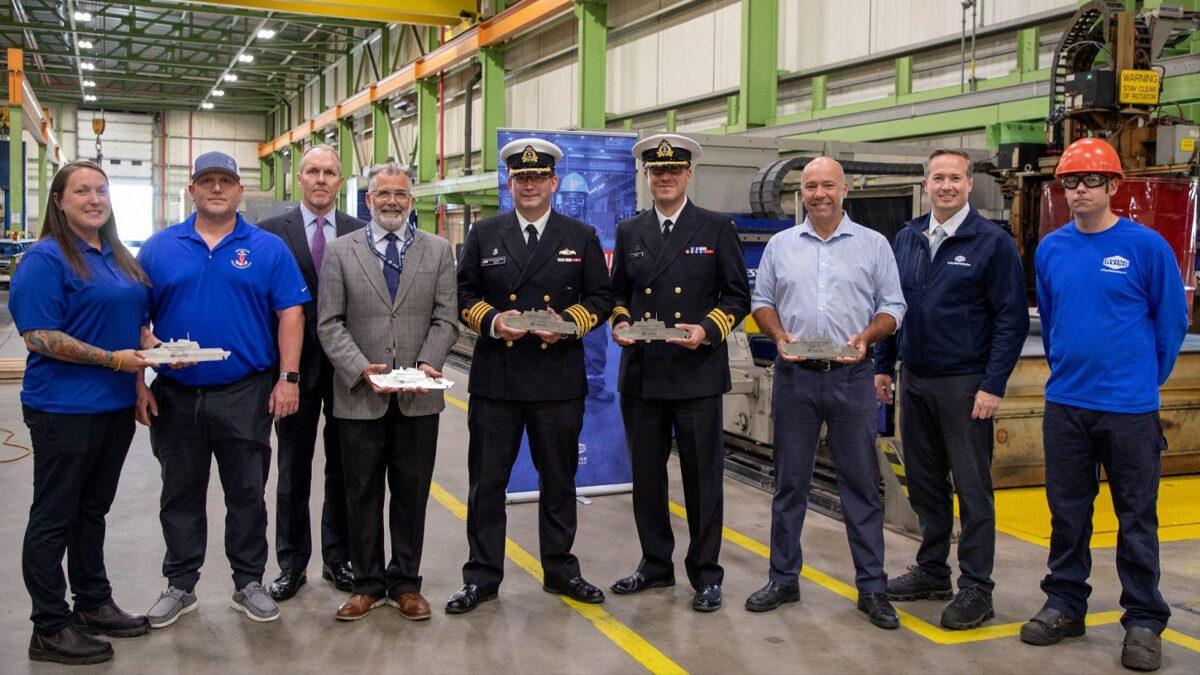Irving Shipbuilding Inc., has cut first steel for the future HMCS Robert Hampton Gray, marking the beginning of production for Canada’s sixth and final Arctic and Offshore Patrol Ship (AOPS). The ship is built under the National Shipbuilding Strategy.
The Marine Fabricators facility of Irving Shipbuilding in Dartmouth fabricates steel components for the AOPS program. Thousands of tonnes of steel are cut and delivered to the Halifax Shipyard each year, with 32 people being involved in this computerized plasma cutting. The steel components are then fabricated in a strategic sequence to meet the production schedule at Irving’s Halifax Shipyard, the largest indoor shipbuilding facility in North America.
The steel for the future HMCS Robert Hampton Gray weighs 3734 kilograms (3.7 tonnes) and will be used in a combination of locations on the ship, including the initial pieces that will begin development of the keel. Upon completion, the vessel will be 103.6 metres long, have a beam of 19 metres, displace 6,615 tonnes and comprise 440,000 parts. Each AOPS vessel has over 300kms of cable and more than 36kms of pipe.
“The National Shipbuilding Strategy is creating jobs and economic activity across Canada, including locally in Halifax where the number of companies and workers benefitting from this program has increased substantially since 2015. As the sixth Arctic and Offshore Patrol Ship to be added to the Royal Canadian Navy fleet under the Strategy, cutting the first steel for the future HMCS Robert Hampton Gray is an important milestone in our work to equip our Navy with the ships they need to protect Canadian interests,” said Andy Fillmore, Member of Parliament for Halifax and Parliamentary Secretary to the Minister of Innovation, Science and Industry.
Two AOPS have been delivered to the Canadian Navy to date—HMCS Harry DeWolf and HMCS Margaret Brooke. The future HMCS Max Bernays (AOPS 3) is due for delivery next month. In preparation for launch later this year, the future HMCS William Hall (AOPS 4) has moved all Mega Blocks to land level and is undergoing final assembly. Construction of the bow, mid-ship and stern Mega Blocks for the future HMCS Frédérick Rolette (AOPS 5) began in June of this year.
The Halifax Shipyard will construct two Arctic offshore patrol ships for the Canadian Coast Guard, followed by 15 Canadian surface combatant vessels for the Navy that are slated to begin construction in 2024.
The Royal Canadian Navy named its sixth Arctic and Offshore Patrol Ship in honour of Lt Robert Hampton Gray, a Canadian naval hero of the Second World War.
“Today marks a momentous event in the life of a ship. We have reached a very significant milestone with the commencement of production on Canada’s sixth and final Arctic and Offshore Patrol Ship, the future HMCS Robert Hampton Gray. Robert “Hammy” Gray was the recipient of the only Canadian naval Victoria Cross in the Second World War. His courage and determination will endure within the steel used to forge the newest and final addition to the Harry DeWolf-class. The Arctic and Offshore Patrol Ships are a critical platform for our Navy, they will ensure that we can patrol, secure and protect Arctic waters for decades to come,” commented Vice-Admiral Angus Topshee, Commander Royal Canadian Navy.
Lieutenant Gray served in the Royal Canadian Naval Volunteer Reserve in 1940 and joined the Royal Navy Fleet Air Arm as a pilot. He embarked in His Majesty’s Ship (HMS) Formidable with 1841 Squadron, joining the war in the Pacific as part of Operation Iceberg, the invasion of Okinawa, Japan, in April 1945.
He was also awarded the Victoria Cross posthumously for courage and determination in carrying out daring air strikes on the Japanese destroyer His Imperial Japanese Majesty’s Ship (HIJMS) Amakusa.
On August 9, 1945, he led two flights of Corsair aircraft to attack Japanese naval vessels in Onagawa Bay. Despite anti-aircraft fire, he pressed on and was hit almost instantly.
Despite his aircraft being on fire and losing one bomb, Lt. John L. Smith continued the attack on a Japanese escort vessel and scored a direct hit, causing the ship to capsize and sink. His plane crashed into the sea and was never recovered.
Lt Gray was a courageous leader and brilliant pilot who continued to inspire and motivate his crew even after his passing. He was the only member of the RCN to be awarded the Canadian naval Victoria Cross from World War II.
For his service and sacrifice in the First World War, Lt Gray was recognized in many ways. In 1946, the Geographic Board of Canada named Gray’s Peak, a mountain in British Columbia’s Kokanee Glacier Provincial Park, in honour of Lt Gray and his brother John, who was also killed during the war.
In 1989, a memorial was erected on Onagawa Bay in his honor, the only such memorial on Japanese soil dedicated to a foreign service member.
“Today marks an historic milestone in the Arctic and Offshore Patrol Ships (AOPS) program as we cut steel on the sixth and final ship of the class for the Royal Canadian Navy. I am proud of our 2,100 shipbuilders, who are committed to continuous improvement and providing quality ships to those who bravely serve. Our workforce has grown by 65% since 2012. To date, we have seen over $4.75 billion in spending commitments to over 325 organizations across Canada,” said Ross Langley, Vice Chairman of Irving Shipbuilding.
“As we begin this last AOPS for the Navy, we are realizing a 50% reduction in the number of production hours it takes to build each ship. Today’s steel cutting is taking place at our Marine Fabricators facility in Dartmouth. It gives me great pleasure to share that our workers at this facility have operated for 7 years running without a lost time safety incident. We look forward to delivering this sixth AOPS ship to Canada in December 2025,” he concluded.

